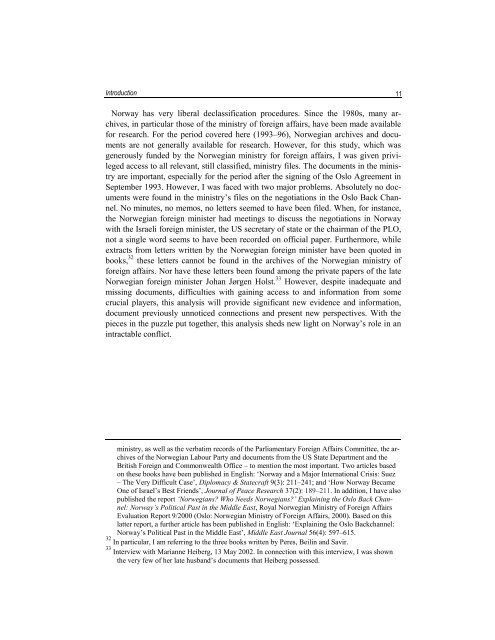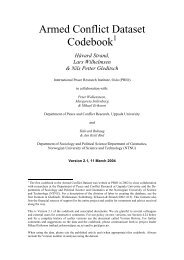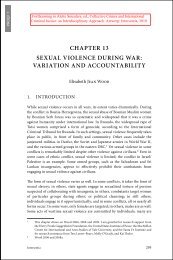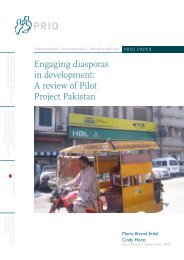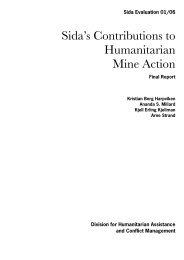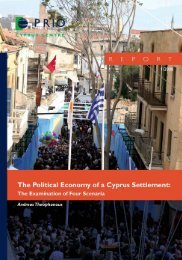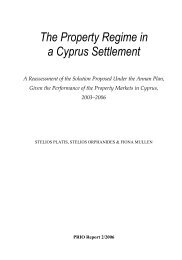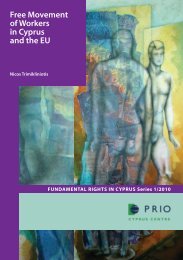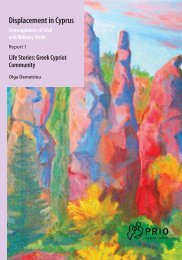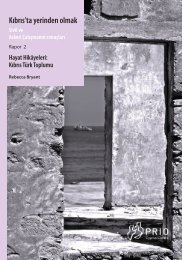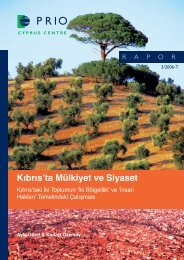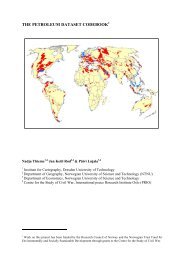Peacemaking Is a Risky Business - PRIO
Peacemaking Is a Risky Business - PRIO
Peacemaking Is a Risky Business - PRIO
Create successful ePaper yourself
Turn your PDF publications into a flip-book with our unique Google optimized e-Paper software.
Introduction11Norway has very liberal declassification procedures. Since the 1980s, many archives,in particular those of the ministry of foreign affairs, have been made availablefor research. For the period covered here (1993–96), Norwegian archives and documentsare not generally available for research. However, for this study, which wasgenerously funded by the Norwegian ministry for foreign affairs, I was given privilegedaccess to all relevant, still classified, ministry files. The documents in the ministryare important, especially for the period after the signing of the Oslo Agreement inSeptember 1993. However, I was faced with two major problems. Absolutely no documentswere found in the ministry’s files on the negotiations in the Oslo Back Channel.No minutes, no memos, no letters seemed to have been filed. When, for instance,the Norwegian foreign minister had meetings to discuss the negotiations in Norwaywith the <strong>Is</strong>raeli foreign minister, the US secretary of state or the chairman of the PLO,not a single word seems to have been recorded on official paper. Furthermore, whileextracts from letters written by the Norwegian foreign minister have been quoted inbooks, 32 these letters cannot be found in the archives of the Norwegian ministry offoreign affairs. Nor have these letters been found among the private papers of the lateNorwegian foreign minister Johan Jørgen Holst. 33 However, despite inadequate andmissing documents, difficulties with gaining access to and information from somecrucial players, this analysis will provide significant new evidence and information,document previously unnoticed connections and present new perspectives. With thepieces in the puzzle put together, this analysis sheds new light on Norway’s role in anintractable conflict.ministry, as well as the verbatim records of the Parliamentary Foreign Affairs Committee, the archivesof the Norwegian Labour Party and documents from the US State Department and theBritish Foreign and Commonwealth Office – to mention the most important. Two articles basedon these books have been published in English: ‘Norway and a Major International Crisis: Suez– The Very Difficult Case’, Diplomacy & Statecraft 9(3): 211–241; and ‘How Norway BecameOne of <strong>Is</strong>rael’s Best Friends’, Journal of Peace Research 37(2): 189–211. In addition, I have alsopublished the report ‘Norwegians? Who Needs Norwegians?’ Explaining the Oslo Back Channel:Norway’s Political Past in the Middle East, Royal Norwegian Ministry of Foreign AffairsEvaluation Report 9/2000 (Oslo: Norwegian Ministry of Foreign Affairs, 2000). Based on thislatter report, a further article has been published in English: ‘Explaining the Oslo Backchannel:Norway’s Political Past in the Middle East’, Middle East Journal 56(4): 597–615.32 In particular, I am referring to the three books written by Peres, Beilin and Savir.33 Interview with Marianne Heiberg, 13 May 2002. In connection with this interview, I was shownthe very few of her late husband’s documents that Heiberg possessed.


